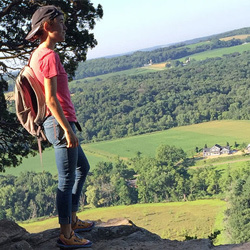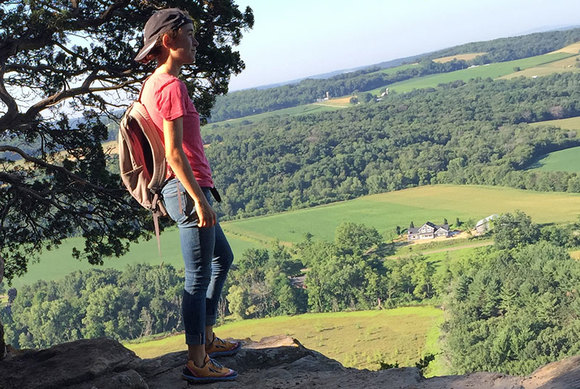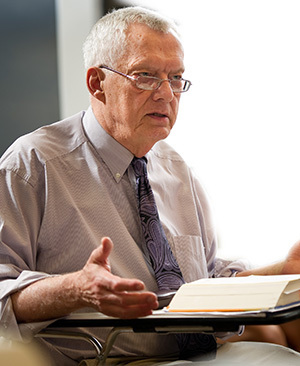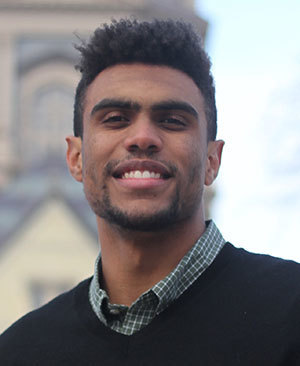

Recent Arts and Letters graduate Molly Seidel completed a capstone project that combined her environmental anthropology work with her passion for sustainability.
________
For John Sitter, sustainability is an issue that requires bright minds in all fields, from the sciences to the liberal arts.
“It’s too big of a problem—intellectually and ethically and politically—for only one discipline,” said Sitter, the Mary Lee Duda Professor of Literature, who helped develop Notre Dame’s interdisciplinary minor in sustainability.
 John Sitter
John Sitter
The program, open to all majors, seeks to inspire students to cultivate practices and ways of living that preserve natural resources for future generations.
“It is important to think about how our different areas of knowledge complement each other and to understand that many of our most serious problems are not well behaved and do not stay within our disciplinary lines,” he said. “They take all of our resources to address.”
Molly Seidel
For 2016 Notre Dame graduate Molly Seidel, that interdisciplinary focus was a perfect fit in an academic career that already sought to connect the humanities and sciences.
Seidel—a four-time NCAA individual national champion in cross-country and track and field—supplemented her anthropology major with coursework in environmental science before adding the sustainability minor.
Her capstone project for the minor brought together her environmental anthropology work with her passion for sustainability. A Wisconsin native, Seidel examined the Ice Age Trail, which stretches 1,200 miles across her home state and is run by the National Park Service in partnership with the Ice Age Trail Alliance.
Seidel worked with the alliance on trail building and community outreach projects in summer 2015 and wanted to study how the trail affects perspectives on the environment and motivates people to protect natural resources in the surrounding areas.
“I was amazed by how the trail brings people together and encourages greater environmental sustainability,” she said, “and seeing this made me want to investigate the positive effects that the trail has on its users.”
After Notre Dame, Seidel plans to launch a career in sustainable business development, potentially focusing on product design and environmental management. Her coursework and research experiences in both the College of Arts and Letters and the College of Science have opened a lot of doors, she said, along with giving her the opportunity to study what she loves.
“Having the flexibility to explore my love of science and my love of the liberal arts has been a priceless experience,” Seidel said. “I’m very grateful I was able to have that opportunity here.”
Corey Robinson
 Corey Robinson
Corey Robinson
Senior and incoming student body president Corey Robinson enjoys the juxtaposition of pairing his Program of Liberal Studies (PLS) major with the sustainability minor.
“It’s a nice mixture of academic questions and practical, real world concerns,” he said. “Sustainability is an issue that is affecting the world now and must be addressed with urgency, whereas PLS focuses on works that transcend time and problems that humanity will always face.”
Robinson, who also has a minor in business economics, interned with the Notre Dame Global Adaptation Index (ND-GAIN) and the Notre Dame Environmental Change Initiative in summer 2015, compiling data on climate change effects and drafting a report on Brazil’s vulnerability to improper agricultural land use. While there, he also conducted research for a senior thesis on deforestation in the Amazon rainforest.
“ND-GAIN helped me see that the root causes of deforestation lie in the economics of the agricultural sector,” he said. “And John Stuart Mill’s utilitarianism was a perfect way to incorporate my PLS education into the project. Utilitarianism directly deals with economics and strives to find a solution that benefits the community at large, not a select group of private individuals.”
Robinson hopes to pursue a graduate program in political theory after graduation. He said the variety of perspectives he’s learned in sustainability and PLS will benefit him in nearly any situation—including his new role as student body president in the 2016-17 academic year.
“PLS has taught me to entertain an idea without subscribing to it and that each side of an argument has validity and a story. It just takes time to understand where they’re coming from,” he said.
“And sustainability has taught me that to accomplish change, there must be a collaborative effort and a common belief. In the same way, if we want to accomplish our initiatives and make a change for students, we must work together as a campus toward a common goal.”
Originally published by Tessa Bangs at al.nd.edu on June 29, 2016.